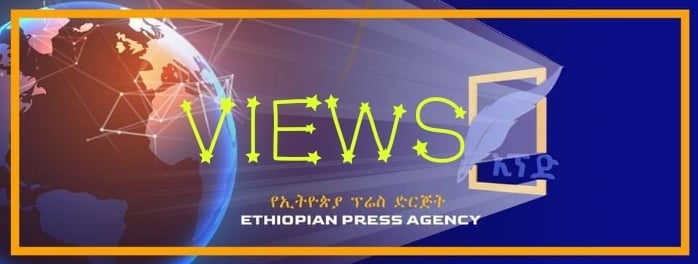
Part I
Ethiopia is under the surge of diplomatic pressures on account of several strategic issues arising from the GERD, global geopolitical rivalry between western powers, China and Russia; as well as some Middle East/Arab states. Irredentist and provocative border claims as a potential trigger with high risk of border conflict with Sudan in the horizon has added to the intense global political pressure on Ethiopia is being shooted from all sides – be it the US, UK, European Union and the Arab League. It is to be noted that all these problems are coupled with one another. Decoupling these problems might help the Ethiopian government and its diplomatic community, including public diplomacy. In this piece, we try to understand this problem in depth in order to efficiently resist and win the diplomatic warfare Ethiopia is facing in a globalized political battlefield.
To start with, the term ‘decouple’ is literally understood as the process of eliminating interrelationship or unlinking/breaking up interrelated issues. The method is used in different fields like business, science, engineering, and others having its own meaning on a contextual basis. The question is then, why does it signify in politics or more specifically, diplomacy – and how can it help resolve diplomatic challenges like the ones Ethiopia is faced with right now? Whether or not Ethiopia benefits from decoupling or coupling the challenges in the effort to address them efficiently is also another important question here. If so, the identification of the challenges that need to be decoupled are the vital initial steps that should be done on the basis of thoughtful and professional analysis. This article explores such important points, briefly but adequately.
Decoupling in the context of diplomacy more or less refers to the idea of dealing with only one diplomatic aspect at a time, without indulging in further connection among the many other aspects. When analyzing the many coupled aspects of the diplomatic challenges Ethiopia is facing right now, the following five are what we consider in need of urgent focus and attention – both from the government and the public at large. These are Water Diplomacy, Interest-Based Diplomacy, International Conflict Resolution (ICR) Diplomacy, and Network & Influence Oriented Diplomacy. These are generic in nature but analyzed briefly and precisely hereunder.
The Water Diplomacy: The political fallouts of the GERD negotiations
Currently, the Water Diplomacy Discord is one of the top diplomatic challenges Ethiopia is facing. The implicit, and at times, explicit global diplomatic pressure is led by Egypt with Sudan as its accomplice. Egypt is using its geographical location as related to the Red Sea and the Suez Canal (a global trade route b/n Africa/Middle East and Europe) and its sociopolitical influence in the Arab League and the Middle East to maneuver global powers towards her interest which has jeopardized Ethiopia’s position in global politics & diplomacy.
Egypt’s geographical advantages of sharing international borders with Israel provide her a strong diplomatic advantage serving as a political bridge b/n the west and the Middle East, and the Arabs & the Israeli’s. To be precise, its geography and Islamic socio-political influence in the Arab world has helped Egypt to create and sustain a strategic partnership with Israel, US, and the Europeans. With that note, the very perception of the Nile (Abay) being the main source of Egypt’s civilization and existence has helped Egypt to frame Ethiopia’s plan on sharing of the Nile Water as a grave national security threat, enormously investing its resources to challenge and weaken Ethiopia on the diplomatic front.
Historically, the Nile water has always been a sensitive issue in Egypt, strong enough to agitate and mobilize domestic sentiment which at times is used to divert internal socioeconomic and political pressures, on both sides of the aisle. Hence Ethiopia’s intention of utilizing the water for generating hydroelectric power is considered as tantamount to posing a dangerous threat towards the very existence of Egypt, which in essence is unsubstantiated and baseless.
The Egyptian political elite deploys various means to prevent Ethiopia’s and other upstream countries’ rightful attempt to benefit from their God given rights to utilize the Nile water that sprouts and flows within their own territory; with the intent to uplift their citizens up from darkness and abject poverty. The Egyptians have mobilized possible legitimate & illegitimate diplomatic strategies – from exploiting standard diplomatic cables through carrier diplomats-to the use of paid lobbyists to influence the foreign policy approaches of influential countries (mainly, the US).
They have also benefited from the backing of the Arab League and media outlets like Aljazeera that project a one-sided view of biased scholars to uphold and enforce Egypt’s interest in the process. Egypt has proved itself unwilling of making fair considerations in terms of understanding the precautions Ethiopia is undertaking to maintain and guarantee uninterrupted and undiminished water flow through openness for constructive dialogue in good faith
This diplomatic war waged by Egypt and its accomplice Sudan is the most ferocious one that Ethiopia is facing right now; in addition to Sudan’s recent injudicious military invasion against Ethiopia to implement their irredentist claim over Ethiopia’s sovereign land. The imprudent behavior Sudan is showing against Ethiopia is precipitated by Egypt’s unwavering support from behind, not to mention the recent global admiration and diplomatic allegiance the military wing of the Sudanese government is getting from the western world.
Had this been the only diplomatic pressure Ethiopia is facing, it could have been probably solved without causing a significant hurdle. Regardless, the challenges Ethiopia is facing in this front has been handled by the Ethiopian government and people responsibly and carefully. Experts, scholars, government officials, and the public are doing their level best to defend and realize Ethiopia’s rightful interest while thoughtfully showing responsibility and sensitivity to the interests of the downstream countries. Had it only been the water diplomatic issue, one could have said that the first filling had solved ⅓ of the problem and now the second filling will make it to ⅔ and what remains is ⅓.
Needless to say, the political crisis triggered by the Water Diplomacy deadlock is coupled with other diplomatic issues which have made Ethiopia’s challenges more complex. It shall also be noted that Ethiopia’s diplomacy in this arena has fallen short to efficiently galvanize the African [despite the wide support for Ethiopia’s ‘African Solutions for African Problems’ stance] and other nations, like South Korea, Cuba, Caribbean states and so forth that have strong historical and sociopolitical ties with the ancient nation; which they consider a beacon of hope and freedom. This being one of the reasons why Egypt has been solidifying military and political collaboration with African nations surrounding Ethiopia, namely Kenya, Uganda, Tanzania and others; while Sudan approaches west African countries whom they share the Islamic Religion that is dominant in West Africa.
Failing to succeed as much as they desire, Egypt and the Sudan have allegedly been taking advantage of Ethiopia’s internal political crisis and backing disgruntled groups like TPLF and OLF ‘Shene’ both on the military and diplomatic fronts – fuming critics and opposition against Abiy Ahmed’s government. Yet, Ethiopia is handling the matter in the most mature and sober way possible deemed from its approach and measured reaction towards the mischievous Egyptian ‘diplomacy’ and the irrational, inconsistent and provocative behavior of the Sudan.
Interest-Based Diplomacy: Ethiopia’s geopolitical leverages: The Red Sea & HOA politics
The national interest of the global powers like the USA, EU, UK, China, Russia, Turkey, Israel, India, Japan, and others is one of the parameters that simultaneously benefit and challenge Ethiopia in global diplomacy. The growing and increasingly visible presence of China in Africa has been a source of anxiety and concern for western geopolitical interests.
This new reality has exposed the HOA region for proxy confrontation between western and eastern superpowers. There are many more variables that can be included here. To mention but few, Africa being source of raw materials for many powerful economic countries, their interest in the continent is increasingly fundamental – especially now that the value of water is claimed to be as important as oil in the global stock market and the need for minerals under African lands for the IT and Military tech has grown all-time high.
Western powers can use water as a national security issue to trigger suspicion and instigate confrontations between neighboring countries in regions with hallmarks of dwindling access to fresh water. The vast population African nations have is also an incentive for increased diplomatic engagement with Africa, human resources being beneficial in terms of accessing affordable labour and increased military personnel (for global and regional peacekeeping operations). Ethiopia, having all the assets [natural and human resources] the rest of Africa have, in addition to being a pioneer in cementing African unity and, forming and hosting the OAU (now AU), and it influence in shaping the African political discourse [more specifically in the horn of Africa (HOA)] – the global powers from West to East have always competed to win Ethiopia as their sole trophy in the geopolitically significant Horn of Africa.
With the exception of the Derg regime that was forced to stick with the communist bloc betrayed by the west that sided with Somalia’s ZaedBarre& the separatist insurgents in the north, and the TPLF- led – EPRDF regime that made itself of full service to the western powers who brought them to power while playing with the Chinese along the side, Ethiopia has always taken a neutral stance in global political affairs – thereby expanding its diplomatic reach on all fronts from Africa to Europe, from Middle East to the Caribbean, and from the US to Russia, China, Japan, Korea and other Asian powerhouses.
Under Abiy Ahmed, Ethiopia has further strengthened its diplomatic ties with the Middle East who relied on Africa for food and water security – and port and military domination over the Red Sea and Bab-el-Mandeb, while influencing the global political dynamics using their oil resource as leverage. Similarly, Ethiopia has strengthened its diplomatic ties with China and Russia – whose growing economic and military influence in HOA countries [ET, ERI, SOM, DJI and SUD] and the rest of Africa is of immense threat to western [most particularly, US] interest in the region.
The Ethiopian government, and the political elite of the country understands this well and consider the unjust and skewed diplomatic pressure from the west under the guise of ‘humanitarian concern’ in Ethiopia’s Tigray region with enormous suspicion. Nonetheless, the government has to find a way to preserve Ethiopia’s longstanding and remarkable diplomatic achievements in terms of building a neutral interest-based relationship, be it with the US, EU, Russia or China; so as to secure Ethiopia’s long-term and short-term interest in global and regional politics.
BY BLEN M. DIRIBA, DEJEN RAS and GHIONAWIW BEDILU
The Ethiopian Herald June 6/2021



